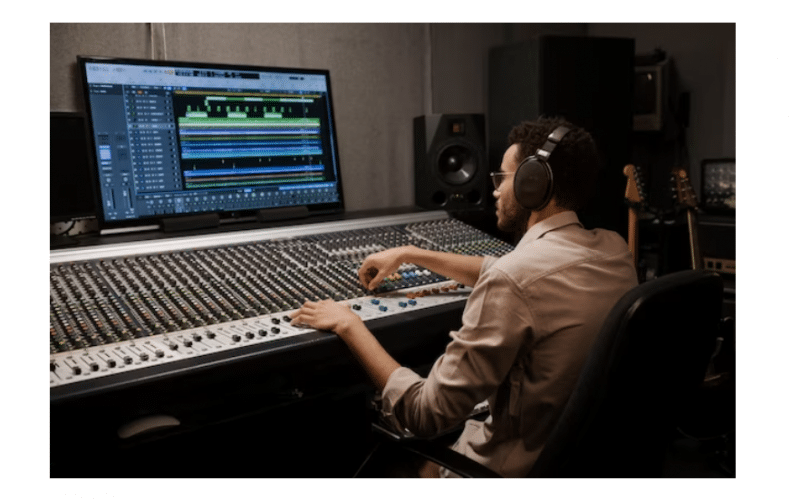The technical facets of creating songs and albums, as well as the audio quality at live performances, are handled by a music engineer. They collaborate with musicians and artists to record and share the soloist’s or band’s artistic vision of life on a recording.
In this article, we go over what a music engineer is, what their responsibilities are, and how they differ from producers.
What Is A Music Engineer?
A music engineer is a technical expert who manages the configuration and use of apparatus for sound recording, editing, mixing, and reproduction. The most common places for music engineers to work are recording studios, television networks, and concert venues. They are also known as “audio, sound, or recording engineers.”
Additionally, music engineers may also work in radio stations, theaters, video game studios, film studios, sporting events, and other places where sound projection for a live or recorded audience is necessary.
What Does a Music Engineer Do?
Depending on your area of engineering expertise and the type of workplace you have, such as a studio or stadium, your job responsibilities as a music engineer may vary. Typical studio engineering procedures might involve:
#1. Setup:
A recording environment that is accommodating and appropriate for the kind of music being produced can be created by studio engineers. Additionally, this might entail getting everything ready and inspecting it, testing the sound quality before recording, and setting a professional tone.
#2. Recording:
Music engineers perform the technical work of capturing and recording sound during the recording stage. Additionally, this could involve singing, speaking, playing instruments, or other sounds. Furthermore, to get sounds onto a computer or to the editing equipment for modification in the subsequent stages of production, music engineers use microphones and connector cables.
#3. Editing:
To create a track that is better, they edit out unwanted noises like clicks and pops. Therefore, in order to achieve the desired outcome, they might also loop or remove specific sections of the recording.
#4. Mixing:
Panning, delay, reverb, leveling dynamics, compression, and equalization are just a few of the extra effects that music engineers can add to a track during the mixing stage to help the artist achieve the recording’s desired sound.
#5. Mastering:
Before mastering, or combining multiple tracks into one, music engineers may meet with artists to go over the track and make any final adjustments. This produces the finished product.
Finally, music engineers in live venues perform setup, soundcheck, performance, and clean-up tasks, adjusting music quality for real-time listening. Therefore, they must possess communication skills, computer skills, data analysis skills, and industry-specific tools, to ensure high-quality audio.
Responsibilities of a Music Engineer
To fit each project, audio engineers use a variety of audio engineering software applications, techniques, tools, and equipment. Among the duties an audio engineer might carry out are the following:
- Utilize tools that record, duplicate, synchronize, or combine sounds, music, or voices.
- Organize music and audio in consultation with producers.
- Set up microphones all over a set and collaborate with boom technicians to get clear recordings of actors while filming.
- Edit the audio by taking out distracting noises or adding more effects.
- Investigate cutting-edge technologies by reading industry publications or going to conferences and seminars.
- Music recording, editing, mixing, and mastering.
- Produce sound effects for radio, television, video games, and movies.
- Create and install audio equipment for live performances.
- Create and install theater audio equipment.
- Selecting and setting up microphones for studio recordings of instruments or vocals.
Jobs or Roles In Music Engineering
A broad range of skills is required in the diverse field of audio engineering. Each job title in this industry has a unique set of duties, and a wide variety of tools and methods are used. The following are some typical audio engineering jobs:
#1. Recording engineer:
A recording engineer records audio from live or recorded performances, frequently in a studio or during performances. In addition to handling technical matters like equipment setup, signal routing, and microphone selection, they may also troubleshoot technical problems. Throughout the creative process, they also work together with producers.
#2. Mixing engineer:
Mixing engineers adjust the volume and incorporate effects to combine various recordings into a seamless whole. They must pay close attention to detail and multitask while listening. Therefore, their task is to seamlessly balance track levels without being too loud or quiet.
Additionally, they might process certain songs, instruments, or other elements by adding reverb, effects, or other elements.
#3. Mastering Engineer:
Mastering engineers produce audio tracks after mixing and assembly, ensuring their sound quality across various speakers, radios, laptops, and stereos. Additionally, they change EQ settings, volume levels, and metadata like ISRC codes to get audio files ready for physical or digital media releases.
Note that this function guarantees the caliber of the finished product, ensuring a smooth transition between songs and a high-caliber audio experience.
#4. Live Sound Engineer:
A live sound engineer is in charge of making sure that the audience at a performance can clearly hear the performers through headphones or speakers. Additionally, controlling microphones and other equipment, adjusting levels and equalization, and resolving any technical issues that might come up during an event are all part of your job description.
#5. Multimedia Sound Engineer:
The soundtracks for videos, movies, and other multimedia projects are made by multimedia sound engineers. To create the right sounds for each project, you’ll need to be an expert in sound technology in this position.
What Is A Music Producer?
Music producers control every step of the recording process to produce songs, musical albums, and soundtracks. Additionally, they use their technical prowess along with their artistic knowledge and skills to lead musicians before, during, and following a studio recording.
Therefore, in order to assist musicians and recording artists in enhancing or changing their sound, producers must also be knowledgeable about musical composition. Consequentially, these experts may also carry out duties resembling those of audio engineers because music producers assume a leadership position in planning, recording, and editing musical tracks.
What Is the Difference Between a Music Producer and a Music Engineer?
The duties that sound engineers execute include the technical aspects of sound recording, whereas music producers are in charge of the musical composition and creative aspects of recording music and audio. Job duties for both professions can occasionally overlap, though. In addition to setting up and using the audio equipment, audio engineers also assist the music producer and artists in the studio and edit and mix sounds using softwares.
Meanwhile, the role of a music producer is to supervise and regulate every step of the audio and music recording process. Furthermore, they are in charge of setting up all recording materials, assigning work to the production team, giving guidance to musicians and recording artists, and, if required, playing instruments or singing on tracks.
Is Music Engineering a Good Career?
Music engineering is a great career choice for someone who values both the arts and technology. A little technical know-how and some imagination are needed. There are lots of things you can accomplish with a sound engineering degree if you are a well-trained academic!
Do Music Engineers Make Beats?
Instead of creating beats, audio engineers typically enhance them. They might produce beats, though, if they take a job in studios where their responsibilities are more varied than those of most audio engineers. Therefore, a programmer is an official designation for someone who creates beats. Beatmakers is a common term for them, particularly in hip-hop culture.
How Long Does It Take To Become a Music Engineer?
Becoming a music engineer can take two to six years. The length of time varies depending on the career choice you make. Therefore, you can pursue postsecondary education through programs like an associate’s or bachelor’s degree. Note that before you can succeed in this position, you must also gain some relevant practical experience.
Do Music Engineers Make a Lot of Money?
The average salary for music engineers is $26 per hour or up to $133,000 per year. Additionally, you may be able to charge more per hour, translating to a higher annual salary, based on your rates, experience, and location. Note that one of the key determinants of an audio engineer’s success is their clientele and studio.
Is Sound Engineer a Stressful Job?
Sound engineering can be stressful due to various factors, including long and irregular work hours, high-pressure situations, physical demands, and technical complexity. These factors can create pressure for sound engineers to ensure smooth live events or recording sessions. However, many find the job rewarding and enjoyable, valuing the creative aspects and the opportunity to work with talented individuals.
Does Music Engineering Require Math?
The math in the music engineering course is quite extensive. However, it is not entirely necessary. The courses in sound engineering provide the knowledge and abilities needed to operate the gear required for mixing, reproducing, and recording sounds.
What is the Average Salary for a Music Engineer?
The average annual salary for a music engineer in the US is $48,000, while music producers earn an average of $49,000. Wages vary by location and qualifications, with experienced engineers earning more based on technical skills and producers earning higher salaries due to leadership responsibilities.
The Best Schools for Music Engineering
#1. Berklee College of Music:
With majors in Sound Design, Electronic Production, Film Scoring, and Video Game Music, Boston-based Berklee has a reputable Music Production and Engineering program. The MP&E major requires strong grades and test results in math and physics, and applicants must submit separate applications. In Valencia, Spain, Berklee also offers a Master of Music in Music Production, Technology, and Innovation which makes it one of the best schools for music engineering.
#2. Drexel University:
Drexel College of Media Arts & Design in Philadelphia offers a Bachelor of Science in Music Industry Studies, focusing on technology and production. Additionally, students have the opportunity to gain experience at Mad Dragon Records and are placed in jobs or internships.
#3. Middle Tennessee State University:
MTSU’s Department of Recording Industry in Murfreesboro, Tennessee, offers a top 10 audio engineering program and a Master of Fine Arts in Recording Arts and Technology. Additionally, students can pursue technical minors in Computer Science, Entrepreneurship, or Video and Film Production.
#4. Cuyahoga Community College (Tri-C):
The Tommy LiPuma Center for Creative Arts, Cleveland, Ohio, is home to Tri-Recording C’s Arts and Technology program. A concert hall, cutting-edge recording studios, and Rock Hall archives are all part of the center. With an articulation agreement with Berklee College of Music, Tri-C is a highly regarded community college that enables students to earn their bachelor’s degree in just two years.
#5. NYU/Steinhardt:
In New York City, NYU/Steinhardt offers programs in music technology leading to bachelor’s, master’s, and doctoral degrees. The institution is a leader in teaching and research using technology, with thirteen studios and a Tonmeister advanced certificate.
#6. Frost School of Music:
Frost, located at the University of Miami, offers Bachelor of Music, Bachelor of Science, and Master of Science programs. Additionally, undergraduates study music, recording, mixing, signal processing, and technical skills in electrical engineering and computer science.
Is there a Degree for Music Engineers?
Students who are interested in a career in music recording, video production, sound reinforcement, broadcasting, audio equipment and software design, studio design, and installation, or any of these fields should consider the Music Engineering Technology program. After completing the undergraduate program, students are awarded a Bachelor of Science.
Related Articles:
JOBS IN MUSIC: Best Profitable Jobs to Do
THE BEST 2023 BUSINESS MUSIC SYSTEMS (Updated)
MUSIC MARKETING: Top 10 Strategies for Better Music Marketing






